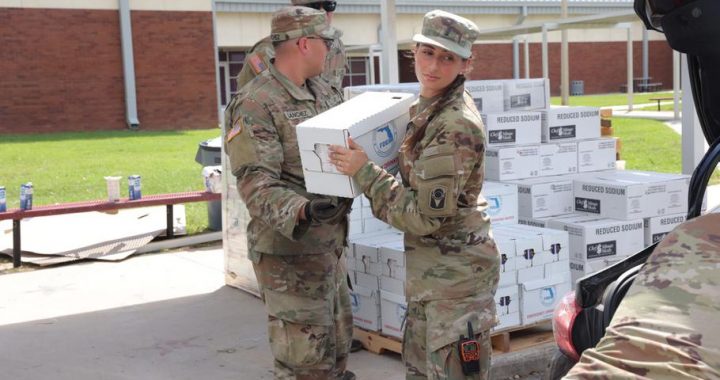Military Families Stressed by Delay in Parental Leave Rules from the Army, Navy and Marine Corps
4 min read
A U.S. Navy sailor holds his newborn baby for the first time after departing amphibious assault carrier USS Tripoli.
One day after the Pentagon issued the long-awaited parental leave policy, the Air Force and Space Force implemented the guidance, allowing airmen and Guardians to take advantage of the time off almost immediately.
But the Army, Navy and Marine Corps were still in a holding pattern Friday, leaving thousands of service members who are planning to grow their families in limbo. Most troops will have to use existing leave policies.
“The Army’s implementation guidance is being finalized and we expect it to be published in the near future,” Madison Bonzo, an Army spokesperson, told Military.com in a statement. “Eligible soldiers may continue to request leave under the previous parenthood, pregnancy, and post-partum policy and, when the new policy is published, they may extend their leave accordingly.”
The Navy was still working to implement its guidance for sailors. That delay was, in turn, holding up the Marine Corps. Military.com requested comment from the Navy, but it did not respond Friday.
The Marine Corps is “implementing guidance for the expansion of the military parental leave program [which] is in final development and will be published once approved for release,” Maj. Jordan Cochran, a Marine Corps spokesman, told Military.com on Friday.
Cochran’s statement also highlighted the fact that the Corps needs the Navy to put out its policy so that it can, in turn, publish its own.
“Upon receipt of the Department of Navy policy, the Marine Corps will finalize and publish implementing guidance via a Marine Corps bulletin and Marine administrative message,” Cochran said.
Typically, both Marines and sailors have to wait for a guidance memo to be published before a Pentagon-driven policy like this can be utilized.
Cochran did, however, hint at the possibility that there would be a period of retroactive approval of more leave for Marines who have already started their parental leave periods.
One Navy spouse, who spoke to Military.com on condition of anonymity because she wasn’t authorized to speak to the media, said the delay and uncertainty will cause stress for families.
“I’m a little nervous about how long it’s going to take to issue guidance,” the spouse said. “I do think that [permanent change of station] season is coming up, and that makes a difference. Families who are looking to take [parental] time off for leave between assignments may be left in the lurch.”
The Pentagon’s new parental leave policy grants new mothers and military fathers 12 weeks of paid leave. It was signed into law by President Joe Biden in December 2021, and the Defense Department was supposed to put it into effect within a year.
It released the rules at the last minute this month. Now, the services need to issue specific guidance to their formations before the rules can be used by the rank and file — what is largely a copy-and-paste policy job.
And many in the Army and Navy reserves, as well as some National Guard components, were left wondering whether the parental leave applies to them.
A Jan. 5 memorandum from the Department of the Air Force made it clear that the new parental leave policy applies to airmen in the reserves and the National Guard. But a lack of communication from the other services is causing worry.
An Army Reserve captain, who spoke to Military.com on condition of anonymity because he was not authorized to speak to the media, said the soldiers who answer to him are worried they won’t receive much-needed time with their new kids.
“When we saw the Pentagon policy, we were wondering why it didn’t include the reserves,” the captain said. “I had a soldier who missed the birth of his daughter because he was deployed, and he’s waiting to see if he gets that time with his newborn, and that time is critical.”
In the private sector, less than 25% of American workers have access to paid parental leave, while federal law mandates companies with more than 50 employees provide unpaid family leave, according to the U.S. Bureau of Labor Statistics. The U.S. is one of the only developed countries in the world without paid parental leave mandated by law for private-sector employees.
The military services seemingly did not work in tandem with Defense Department policymakers and did not have the leave policy ready to go as intended by the new law. The Army has roughly 400,000 parents, including reserve components, with about 6,000 soldiers pregnant at any given time, according to service data.
The slow rollout comes after recent strides in quality-of-life boosts for soldiers. A new policy last year grants up to 42 days of convalescent leave after a miscarriage for men and women, and commanders can also authorize additional time off for physical and emotional recovery. Last year, the National Guard kicked off a limited pilot program granting child care for troops during their drill weekends.





